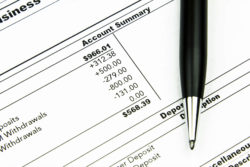Top Class Actions’s website and social media posts use affiliate links. If you make a purchase using such links, we may receive a commission, but it will not result in any additional charges to you. Please review our Affiliate Link Disclosure for more information.

According to a Forbes article, 2009 was a record year for financial institutions to rake in patron overdraft fees with $37 billion collected. While not the peak, 2012 was also significant with $32 billion collected from consumers. This represented a $400 million uptick from 2011.
In the Forbes article it stated that the Consumer Financial Protection Bureau (CFPB) did a 2012 investigation into the rapid rise of overdraft charges and confirmed that several financial organizations reorder transactions regardless of whether they are Automatic Teller Machine (ATM) cash withdrawals, hard-copy checks, or debit card transactions from the highest to the lowest amount in an effort to increase the number of times they can levy an insufficient fund fee which is typically around $35 per incident.
How a Bank Can Reorder Transactions to Maximize Gain
In a pre-computerized banking era, there was a significant lapse of time between the writing of a hard-copy check and the debiting of the money from the associated account. Consumers of more modest means might have relied upon this time gap and floated at least one check hopeful that their paycheck would be deposited before it was subtracted from their balance.
If not, they found out when they received their monthly printed statement that they were charged an overdraft fee and went through a process of manually reconciling their checkbook register against the record of the bank.
Since online banking access, smartphones, and debit cards have appeared on the scene, consumers can see their bank activity and daily balance almost instantly and have reduced the financial industry’s ability to make a profit through charging overdraft fees sight unseen. Yet, purportedly with several banks daring to reorder transactions highest to lowest, they have found a way to recover this profit. It usually affects those of low to modest means the most.
People that maintain high checking balances may never feel the impact of a bank that will reorder transactions from highest to lowest amount. But if you are a young person just starting out on a minimum wage, a college student, or a senior citizen on a fixed income, you may be likely to painfully experience the consequences.
For example, if nearing the end of a pay period your balance gets as low as $50, but you still need to make a few purchases to tide you over, the bank’s decision to process a $40 transaction that was made after three $10 transactions can mean the difference between the account being charged one overdraft fee or two. The latter is great for the institution’s bottom line, but the patron will spend a sizable chunk of his next paycheck bringing his account back to zero and increase the likelihood that he will not have the funds to make ends meet to the following paycheck.
Since institutions vary in their overdraft policies and procedures, it’s important to shop around when looking for a bank.
Do YOU have a legal claim? Fill out the form on this page now for a free, immediate, and confidential case evaluation.
The attorneys who work with Top Class Actions will contact you if you qualify to let you know if an individual lawsuit or class action lawsuit is best for you. Hurry — statutes of limitations may apply.
ATTORNEY ADVERTISING
Top Class Actions is a Proud Member of the American Bar Association
LEGAL INFORMATION IS NOT LEGAL ADVICE
Top Class Actions Legal Statement
©2008 – 2024 Top Class Actions® LLC
Various Trademarks held by their respective owners
This website is not intended for viewing or usage by European Union citizens.
Get Help – It’s Free
Join a Free Bank Overdraft Fee Class Action Lawsuit Investigation
If your bank and credit union has engaged in deceptive overdraft fee practices, you may have a legal claim. Fill out the form on this page now to find out if you qualify!
An attorney will contact you if you qualify to discuss the details of your potential case.
PLEASE NOTE: If you want to participate in this investigation, it is imperative that you reply to the law firm if they call or email you. Failing to do so may result in you not getting signed up as a client or getting you dropped as a client.
In order to properly investigate overdraft fee claims, you may be required to disclose bank statements to overdraft fee attorneys. Please note that any such information will be kept private and confidential.












